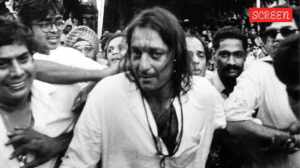In picturesque Darjeeling, amid the whistling toy train, the scenic beauty of the lush green hills and the quaint winding tracks, a young and handsome Rajesh Khanna, accompanied by his friend (Sujit Kumar), appears in an open jeep singing, “Mere Sapnon Ki Rani Kab Ayegi Tu?”, determined to woo his lady love, Sharmila Tagore (seated in the toy train). Rajesh’s playful and flirtatious expressions are difficult to miss as they depict a lover’s anticipation and impatience. While you can’t miss Rajesh’s infectious, onscreen charm, Kishore Kumar‘s melodious voice, which breathes life into Anand Bakshi’s poetic lyrics, strikes a chord, perfectly capturing the essence of young love and longing. Can one imagine any other voice singing those lyrics for Rajesh? Could any other singer have done justice to Aradhana’s song other than Kishore’s?
 Singer Kishore Kumar was associated with Rajesh Khanna as his on-screen voice and the duo gave Hindi cinema many classics including “Mere Sapno Ki Raani,” “Chingari Koi Bhadke,” “Yeh Jo Mohabbat Hai” and “Roop Tera Mastana”, among others. (Photo: Express Archives)
Singer Kishore Kumar was associated with Rajesh Khanna as his on-screen voice and the duo gave Hindi cinema many classics including “Mere Sapno Ki Raani,” “Chingari Koi Bhadke,” “Yeh Jo Mohabbat Hai” and “Roop Tera Mastana”, among others. (Photo: Express Archives)
Kishore Kumar’s voice was the soul of countless characters and actors, breathing life into them in ways that even the actors themselves couldn’t fully encapsulate, but his collaboration with Rajesh Khanna changed the late actor’s career in a way that he didn’t imagine. Shakti Samanta’s musical drama, Aradhana, was the first time Kishore had sung for Rajesh, still a ‘newcomer’ then, but it was the beginning of a new era. The film was one of the highest-grossing films of 1969, establishing Rajesh as a superstar. Its hit music was a phenomenon in itself. “Mere Sapno Ki Rani Kab Ayegi Tu,” “Roop Tera Mastana,” “Kora Kagaz Tha Yeh Man Mera,” and “Safal Hogi Teri Aradhana” became instant classics. Kishore’s voice, in particular, played a pivotal role in the film’s success, with “Roop Tera Mastana” earning him a Filmfare Award for Best Male Playback Singer. Rajesh’s meteoric rise to stardom was closely intertwined with Kishore’s unparalleled talent as a playback singer with their collaboration resulting in some of the most memorable songs in Bollywood history. Kishore’s voice perfectly complemented Rajesh’s on-screen persona, and the success of their songs played a crucial role in his films’ blockbuster status.
Kishore Kumar holds the unparalleled record of singing an astonishing 245 songs picturised on Rajesh Khanna across 92 films. Rajesh, in an old interview, published on Anil Kumar Pandey’s YouTube channel, said, “Aradhana se mera janam hua hai (I was born after Aradhana).” Rajesh was captivated by the magic of Kishore’s voice, and Kishore, in turn, was enamoured with Rajesh’s charming on-screen presence. Soon, the two began collaborating on almost every project Rajesh Khanna worked on. The actor recalled that when he heard Kishore da, as he was lovingly called, for the first time, he thought it was his own voice. “Jab maine Aaradhna ka pehla gaana, “Mere Sapno Ki Rani Kab Ayegi Tu? suna, mujhe aisa laga ki yeh gaana Rajesh Khanna khud gaa raha hai… jaise do jism aur ek jaan ho gaye (When I first heard ‘Mere Sapnon Ki Rani Kab Aayegi Tu’ I was astonished. I felt I was singing the song… as if we two bodies were entwined in one soul).”
Kishore Kumar, who lived to sing, was also a great actor, who wowed the audience with his performance in films like Chalti Ka Naam Gaadi, Half Ticket, Jhumroo, Padosan, and Pyar Kiye Jaa, and therefore, it is said that it also the actor in him which helped him ‘act’ through his voice. In the case of Rajesh Khanna for who he sung “Yeh Sham Mastani” (Kati Patang), “Chingari Koi Bhadke” (Amar Prem), “Oh Mere Dil Ke Chayan” (Mere Jeevan Saathi), “Zindagi Ek Safar Hai Suhana” (Andaz), “Jeevan Se Bhari Teri Aankhen” (Safar), “Zindagi Ke Safar Mein Guzar Jaate Hain Jo Muqaam” (Aap Ki Kasam) and countless hit numbers, their voices became almost indistinguishable with Rajesh’s expressive eyes and playful demeanour complementing Kishore’s vocal artistry.
Story continues below this ad
Rajesh’s films in the late 1960s and 1970s were emblematic of a transformative period in Indian cinema, ushering in the era of the romantic hero archetype and soft romanticism. The actor was the face of the era, but it’s debatable whether his ‘exaggerated style’ would have achieved the same iconic status without the perfect counterpoint of Kishore’s versatile vocals. Kishore da’s ascent to stardom mirrored Rajesh’s meteoric rise. By deftly imitating the actor’s signature style — head nodding and eye-closing gestures — the singer infused his vocals with a similar warmth and tenderness.
While their collaboration will be remembered for decades if not centuries, to come, Kishore Kumar, who was already a revered singer-actor and known to be ‘eccentric,’ gave a tough time to his producers, and had a condition before he agreed to sing for Rajesh Khanna in Aradhana — he wanted to meet the actor he was being asked to sing for. “It is true that Kishore Kumar had earlier refused Shaktida to give playback for me in the movie Aradhana but why he refused was a suspense that I learned later and my affection for him as a singer grew immensely,” the Bandhan actor said in an interview.
He added, “Shaktida told me that Kishore Kumar had turned down to sing for me but would agree if I met him. I reached his bungalow the next day. Kishore Kumar looked in a solemn mood. He asked me the reason for joining the film profession. I candidly replied that it was my passion and through cinema I wished to serve society through entertainment. The answer impressed him and he got into his usual jolly mood.”
Story continues below this ad
In reality, Kishore wanted to observe how Rajesh spoke, his body language and his mannerisms so that he could infuse the same emotions into the songs and sing as close to his voice. Impressed by the actor’s simplicity and his desire to serve the country through his art, Kishore promised to sing for him as he wished him to succeed.
Rajesh Khanna was also famously possessive of Kishore Kumar’s voice. There was a time when the superstar refused to let any other singer lend their voice to his characters. But an unpredictable Kishore refused to sing an important song for the 1972 blockbuster film, Dushman. The song, “Wada Tera Wada” in question was destined to be a chart-topper, but Kishore, believing it was better suited for Mohammad Rafi, initially refused to sing it.
 Kishore Kumar died on October 13, 1987. Express Archive Photo
Kishore Kumar died on October 13, 1987. Express Archive Photo
“Jao Mohammad Rafi se gawa lo gaana (Go and get it sung by Mohammad Rafi,” he said, stressing that Rafi’s voice would do justice to the playfulness of the foot-tapping qawwali song. When Rajesh learned of Kishore’s decision, he was adamant that he only wanted Kishore to belt out the number, and despite several attempts to persuade him, the singer didn’t budge. Music director duo Laxmikant-Pyarelal cleverly suggested dropping the song altogether if Kishore didn’t change his mind. Journalist and writer Chaitanya Padukone, in his interview with the Times of India, recalled Laxmikant told Kishore that if he didn’t sing, they would have to drop the song. Rajesh also echoed a similar sentiment. Reluctantly, Kishore gave in to the pressure. The song “Wada Tera Wada” went on to become an iconic number due its infectious energy and Kishore’s signature style. Dushman was a phenomenal success, earning Rajesh the Filmfare Best Actor Award. The film’s impact was so profound that it was remade in multiple languages. It’s a testament to the extraordinary chemistry between Rajesh and Kishore, a partnership that defined an era.
In 1971, when Rajesh Khanna, the quintessential romantic hero, effortlessly lip-synced to Kishore Kumar’s exuberant and unconventional “Zindagi Ek Safar Hai Suhana” while riding a motorcycle and yodelling in Andaz, it marked a seismic shift in Hindi cinema. The joyous abandon of the song, combined with Rajesh’s charismatic screen presence, challenged the established norms of the era. It felt as if the old guard, epitomised by Shammi Kapoor and the vocal prowess of Mohammed Rafi, had been momentarily eclipsed. With this single performance, Kishore had irrevocably cemented his status as a pop culture phenomenon.

Story continues below this ad
Their destiny was intertwined in more than one way. Sure, he helped him attain success and stardom by belting out hit numbers like “Bheegi Bheegi Raaton Mein” “Pyaar Deewana Hota Hai” “Chingari Koi Bhadke” “Kuch Toh Log Kahenge” and many more, but the Padosan actor, unknowingly, gave Khanna one of the most important films of his career, 1971’s Hrishkesh Mukherjee film Aanand. The movie was initially offered to Kishore. According to Gulzar, Kishore, popular for his mischief and giving a ‘tough time to his directors and producers’, was initially set to star in Anand. But just a few days before the shoot, Kishore, in a meeting to discuss his look in the film, shocked everyone by turning up completely bald. Poet-lyricist Gulzar, who penned the lyrics for Anand, in his book, Actually… I Met Them: A Memoir, spoke about how he avoided playing the titular hero.
ALSO READ Ranbir Kapoor says it’s important to deal with mental health ‘quietly’ and ‘with grace’: ‘Don’t use it as an excuse to not do things’
“We were all shocked! On top of that, Kishore da went around the office dancing and singing, ‘What will you do now, Hrish?,” he wrote in his book, adding, “Consequently, Rajesh Khanna was finalised for the role in a very short time. Perhaps Kishoreda never wanted to play the character. Nevertheless, I have never seen someone cutting off their nose to spite their face in such a manner,” recalled Gulzar. Rajesh Khanna’s portrayal of Anand, a terminally ill cancer patient with an unyielding zest for life, showcased his exceptional acting prowess. Anand, also starring Amitabh Bachchan, won several awards, including the Filmfare Award for Best Film in 1972.
 Kishore Kumar holds the unparalleled record of singing an astonishing 245 songs picturised on Rajesh Khanna across 92 films (Express Archive Photo)
Kishore Kumar holds the unparalleled record of singing an astonishing 245 songs picturised on Rajesh Khanna across 92 films (Express Archive Photo)
The synergy between Rajesh Khanna’s suave charm and Kishore Kumar’s one-of-a-kind singing style was nothing short of cinematic alchemy. Like Yin and Yang, the two complemented each other, with Kishore’s rich vocals giving life to Rajesh’s heartthrob persona on screen, resulting in an alluring symphony that transcended time. Kishore was more than just a singer for Rajesh; he was the emotional architect of his on-screen persona. From the exuberant joy of “Zindagi ek safar” to the melancholic introspection of “Kuch toh log Kahenge,” Kishore’s voice mirrored the intricate nuances of Rajesh’s characters. He transformed Kamal’s despair in “Aap Ki Kasam” into a haunting melody and Arun’s passionate love for Sharmila Tagore in Aradhana into a fiery anthem.




 Singer Kishore Kumar was associated with Rajesh Khanna as his on-screen voice and the duo gave Hindi cinema many classics including “Mere Sapno Ki Raani,” “Chingari Koi Bhadke,” “Yeh Jo Mohabbat Hai” and “Roop Tera Mastana”, among others. (Photo: Express Archives)
Singer Kishore Kumar was associated with Rajesh Khanna as his on-screen voice and the duo gave Hindi cinema many classics including “Mere Sapno Ki Raani,” “Chingari Koi Bhadke,” “Yeh Jo Mohabbat Hai” and “Roop Tera Mastana”, among others. (Photo: Express Archives) Kishore Kumar died on October 13, 1987. Express Archive Photo
Kishore Kumar died on October 13, 1987. Express Archive Photo
 Kishore Kumar holds the unparalleled record of singing an astonishing 245 songs picturised on Rajesh Khanna across 92 films (Express Archive Photo)
Kishore Kumar holds the unparalleled record of singing an astonishing 245 songs picturised on Rajesh Khanna across 92 films (Express Archive Photo)






























